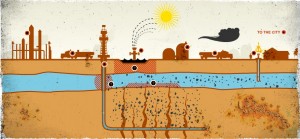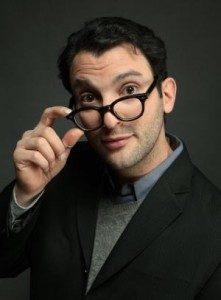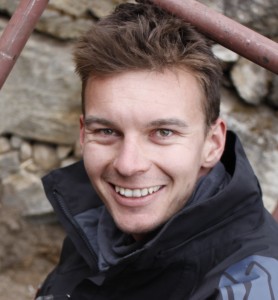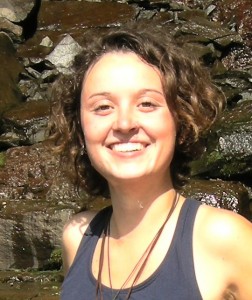Natural Gas: Not So Fracking Clean
By Jessica Schug MS ’15, Judson Peck MS ’15, Violeta Borilova Mezeklieva MS ’15

GASLAND I was nominated for Best Documentary OSCAR 2011, Won EMMY for Best Non Fiction Directing, Won Sundance Film Festival Special Jury Prize
Natural gas is promoted as a clean energy alternative to fossil fuel, providing energy that will reduce both global warming and the United State’s dependence on foreign oil. After being approached by a US natural gas company to drill on his family land in Pennsylvania, Josh Fox, was concerned for the sustainability of the watershed he lived in. He started investigating hydraulic fracturing, the process that would be used to extract natural gas in the Delaware River Basin, which supplies water to nearly 16 million people living in New York, New Jersey and Philadelphia. Josh traveled across the country with his camera to discover what was coming to his own backyard… documenting case after case of environmental degradation, human health and safety risks, and political corruption. Josh Fox, Founder and Producing Artistic Director of the International WOW Company, reveals the hidden truth of natural gas, first in his award-wining documentary film, Gasland, and now in Gasland II.
Fracking Facts
Hydraulic fracturing or “fracking” involves injecting a mixture of hundreds of toxic chemicals and millions of gallons of water (fracking fluid) at high pressure down bore wells that extend horizontally into the ground to fracture the shale bedrock and release natural gas. The process produces a range of environmental and social harms from groundwater and air pollution to global warming:
- Many of the toxic chemicals, which are known to cause cancer and birth defects, remain in the ground and contaminate drinking water as they are not biodegradable and cannot be filtered out.
- The fracking fluid that is extracted is evaporated releasing the toxic chemicals into the air, which creates harmful air pollution.
- Fugitive methane emissions are released at all stages of the fracking operation. Methane is a greenhouse gas that is 70-105 times more potent than an equal mass of CO2 upon release over a 20-year interval. Recent reports suggest fugitive methane emissions are so substantial that they outweigh the climate benefits of natural gas as compared to coal.

What’s happening now?
There have been worldwide protests against drilling, and yet governments are still allowing hydrofracking to happen. Fox explained that without government response, this problem will still exist. The political will needs to be strong and the people can’t give up. He addresses the most important question regarding this issue: “Does your government listen to the people?” It may seem like a silly question, but there are a few (and unfortunate) reasons why they might not.
- MONEY. The natural gas industry lobbied endlessly and spent millions of dollars to ensure that the government is on their side.
- There is a surprising amount of crossover with government officials and employees of the natural gas industry.
- A misunderstanding over the “cleanliness” of natural gas.
- The more this industry develops, the more difficult and more expensive it will be to have a paradigm shift to renewables.
Despite this gloomy prognosis, there is still hope. Some state governments are listening to citizen and community protest, or at least still debating the issue. In NYS, Governor Andrew Cuomo has upheld the moratorium on drilling until further tests are completed on the safety of hydrofracking. With more political pressure on our officials and the divestment movement in the oil and gas sectors, perhaps it is possible to stop and further damage from happening.

Source: http://blogs.ft.com/energy-source/files/2011/01/Josh-Fox.jpg
What’s next?
So if the burning of fossil fuels harms the environment, and nowhere is an argument that extracting natural gas is even worse, then what should we use as a source for energy?
Josh Fox poses the challenge of creating a paradigm shift from our current resources based on the use of wind and solar power. He counters detractors who claim that these types of renewables can’t supply the current demand and defends it by saying that bundling these resources can meet a significant portion of our energy needs. Instead of spending money on fixing current technology, or investing money on research towards abundant if not renewable sources such as natural gas which are documented to have negative consequences for health and the environment, we should shift our sources towards truly clean energy to prevent future degradation.
However, switching towards clean energy is not going to be easy or quick. There are controversies and challenges with wind and solar energy. Even further, the complications arise with those invested in the natural gas and coal industries.
This paradigm shift will emerge, as Josh Fox suggests, when people join their local community activists who advocate banning fracking, when students join divestment action on their campuses, and when this conversation pushes people to reconsider our current regulation, given we live in a democratic world; or at least that’s how we picture it.
To listen to this and other National Climate Seminars, click here.



